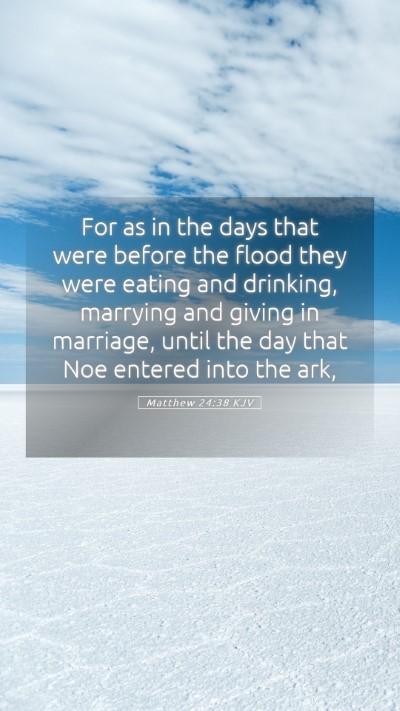Understanding Matthew 24:38
Verse: “For as in the days that were before the flood they were eating and drinking, marrying and giving in marriage, until the day that Noah entered into the ark.” (Matthew 24:38)
Overview of the Verse
Matthew 24:38 presents a significant teaching from Jesus regarding the nature of humanity in the face of impending judgment. This verse draws a parallel between the ordinary activities of daily life and the unexpected arrival of divine judgment during Noah’s time, emphasizing that people were oblivious to the seriousness of their spiritual condition.
Insights from Public Domain Commentaries
Matthew Henry's Commentary
Matthew Henry explains that this verse illustrates the ignorance and negligence of the people prior to the flood. They were engaged in everyday pursuits, such as eating, drinking, and marriage, which are normal human activities. However, Henry cautions that these activities became a distraction from the looming judgment and a failure to heed God's warning through Noah. This indicates that spiritual readiness is crucial, as the stakes are significantly high in our relationship with God.
Albert Barnes' Notes
Albert Barnes provides a thorough look at the implications of this verse by discussing the parallelism drawn between the days of Noah and the current world. He asserts that just as the people ignored Noah's warnings and carried on with their lives, the society in Jesus’ time was similarly engrossed in materialism and indifference toward spiritual matters. Barnes emphasizes that the coming of the Son of Man will take many by surprise, highlighting the importance of vigilance and watchfulness.
Adam Clarke's Commentary
Adam Clarke furthers the understanding of this verse by noting that the actions of the people before the flood were not inherently sinful but rather reflect a state of unawareness. He draws attention to the fact that normal licenses of life can obscure deeper spiritual truths and distract individuals from preparing for the eventual return of Christ. Clarke encourages readers to be mindful of the unremarkable yet critical message of readiness amidst commonplace activities.
Key Themes and Takeaways
- Ordinary Life vs. Spiritual Readiness: This verse underscores the theme of how ordinary daily activities can supersede spiritual vigilance. It challenges individuals to consider how day-to-day pursuits may distract them from their relationship with God.
- Divine Judgment: The passage serves as a sober reminder of God's judgment, encouraging believers to remain alert and mindful of their spiritual state.
- Historical Context: Understanding the context of Noah’s time, where society was engaged in apathy towards warnings from God, helps clarify the urgency in Jesus’ message.
Practical Applications
In applying the principles from Matthew 24:38 to modern life, individuals are encouraged to reflect on the significance of spiritual readiness and the importance of prioritizing faith amidst a bustling life. To achieve a more profound Bible verse understanding, one might consider the following:
- Engagement in Bible Study Groups: Join groups to discuss Scripture and gain insights into biblical teachings.
- Use Bible Study Tools: Utilize resources that promote deeper exploration of biblical texts, such as concordances and commentaries.
- Daily Reflection: Set aside time for daily devotion and reflection on how biblical teachings apply to personal life choices.
Cross References
This verse connects with several significant passages:
- Genesis 6:5-6: Discusses God’s view of wickedness before the flood.
- Luke 17:26-27: Reiterates the comparison between the days of Noah and the end times.
- 1 Thessalonians 5:2-3: Talks about the suddenness of the Lord’s coming, akin to the flood’s arrival.
Conclusion
Matthew 24:38 invites believers to reflect on the state of their hearts and readiness for Christ’s return. Through the teachings of public domain commentaries such as those by Matthew Henry, Albert Barnes, and Adam Clarke, it becomes clear that a diligent examination of our lives, amid daily activities, is necessary for spiritual preparedness. This verse serves not only as a historical account but as a pertinent warning to remain alert and deeply committed to understanding Scripture.


